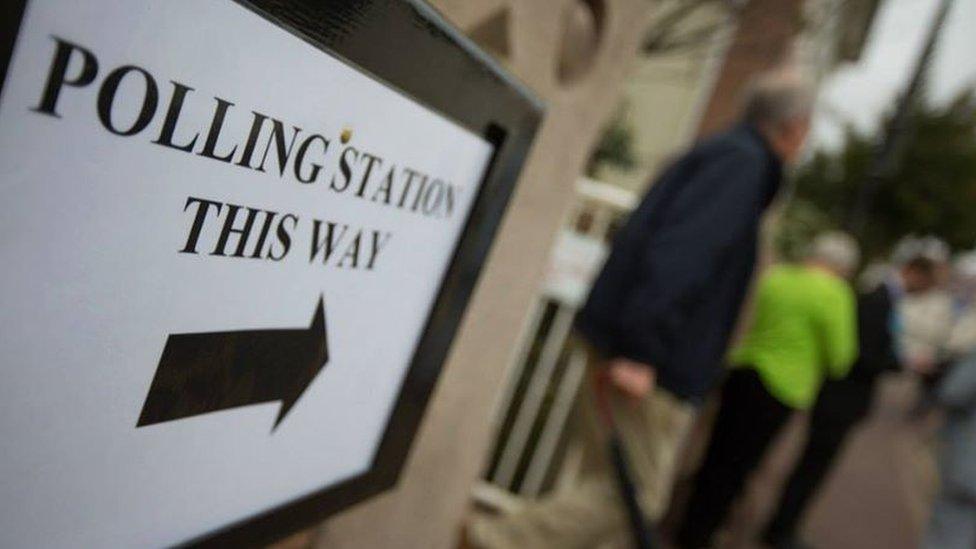Jersey Election 2022: What are the big issues?
- Published

For candidates hoping to gain enough votes to become one of Jersey's next States members, the campaign period is a busy time.
But for those who get enough votes to secure a seat in the chamber, the hard work is only just beginning.
From global challenges to more parochial concerns, the island's next politicians have a number of significant decisions to make.
Here are just some of the big issues they will need to consider.
Housing
A home. We all need one, but it has been widely accepted that, for a number of years, supply has not met demand.
As a consequence, properties in Jersey have never been more expensive to buy than they are now.
The most recent figures, from the end of March, show the average three-bedroom house now costs £898,000.
Overall, average house prices rose 16% in the year to March 2022.
And it is not just the cost of buying property that has jumped up recently. Average rental prices rose by 12% between March 2021 and March 2022.
The result is that many islanders feel they will never be able to save enough to buy their own home in the island.
And even those already on the property ladder have expressed concerns about their children's chances of becoming homeowners in the future.
So, how to solve this issue?
Well, some have argued the island simply needs to build more homes. But the big question in an island nine miles by five is always: "Where?"
The States Assembly voted earlier this year to save a number of green-zone fields that had been earmarked for new housing, so alternative solutions are probably going to be needed.
The island's next politicians will have to decide whether that means making better use of States-owned land, incentivising downsizing, building taller housing blocks, offering more financial support to buyers and tenants; or - probably - all of the above and more.
And while attempting to make properties more affordable for people who do not already own them, politicians will also need to ensure homeowners do not see their biggest assets plummet in value.

Cost of living
Owing to comparatively limited market competition, and the fact that the vast majority of goods bought and sold in the island need to be imported, Jersey has perhaps never been considered a "cheap" place in which to live.
But recent events - including Brexit, the Covid pandemic and Russia's invasion of Ukraine - have resulted in prices increasing from what many feel was already a fairly high base.
From energy to entertainment, food to fuel, almost everything appears to be becoming more expensive.
Meanwhile, wages have not kept pace with inflation.
Put it all together, and some islanders have told BBC Jersey they no longer see a future in the island, while others have already left in search of a more affordable life elsewhere.
Jersey's next politicians will need to find a local solution to this global challenge.

Population and staffing
According to the 2021 census, 103,267 people lived in Jersey.
Some people feel that, for an island of Jersey's size, the population is too large.
But businesses in numerous sectors have reported difficulties in attracting and retaining staff, with some reducing their working hours or closing altogether as a result.
Given this, some islanders believe the answer is to allow Jersey's population to grow yet further.
However, with housing and living costs rising, is the island an attractive place for workers?
Few would disagree that successive States assemblies have struggled to sufficiently solve Jersey's perplexing population problems.
Some feel improving productivity - in other words, ensuring each working person achieves more - is the solution.
The island's next politicians will have to consider this issue, which is linked to more or less every challenge the island faces.

Education
Conversations about Jersey's population often lead to discussions about the skills available among the local workforce, and what can be done to ensure islanders are able to contribute to the economy in the future.
Whether through apprenticeships or more investment in local degree courses, the next States will need to think about ways of helping islanders gain new abilities without having to go abroad to study.
Additionally, calls continue for a new primary school in St Helier, while there are ongoing concerns about the impact of the pandemic on children's studies and mental health.
Meanwhile, politicians will need to consider the thoughts of Jersey's school teachers after a recent survey found survey found nearly 60% considered leaving their jobs in the past year.

Healthcare
Work to offer more health services in the community in Jersey - rather than in hospital - will continue during the next political term.
While few have said they disagree with the concept, some islanders - including health practitioners - have raised concerns about how the new Jersey Care Model will work in practice.
And further to all this, of course, there's a new hospital, with a budget of £804.5m, to build.
Planning approval has been granted, but some remain unhappy with what is being proposed.
Will politicians seek to revisit the plans?

Climate change and the environment
Earlier this year, politicians signed off on Jersey's Carbon Neutral Roadmap - a plan with policies for tackling climate change and target dates for action to be taken.
It was aimed at ensuring Jersey reaches net zero CO2 emissions by 2050.
The next States Assembly will be tasked with putting this plan into action.
Meanwhile, politicians will have to balance a number of competing factors, as the need for new homes is likely to mean increasing pressure on the island's natural environment.

Follow BBC Jersey on Twitter, external and Facebook, external. Send your story ideas to channel.islands@bbc.co.uk, external.
Related topics
- Published13 June 2022
